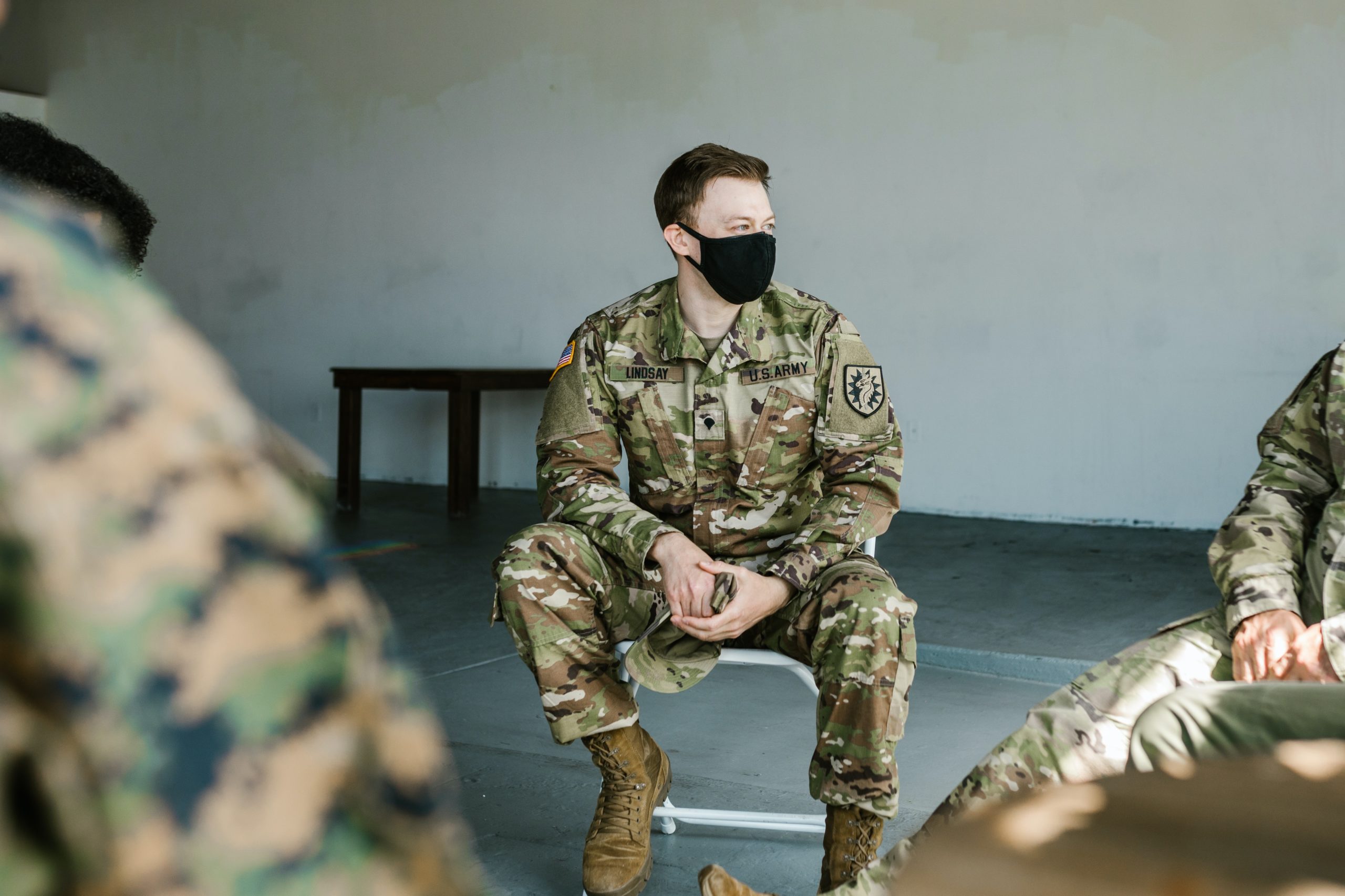Opioid Addiction in Veterans
Questions About Treatment?
Our knowledgeable team is ready to discuss your situation and options. Your call is confidential with no obligation required.
Veterans and Addiction
Veterans returning from combat are often faced with many challenges, and addiction may be one of them. Opioid addiction has become a prevalent problem over the last few years including amongst veterans, and it can be difficult to find a treatment process that meets veterans’ specific needs.
Veterans face several stressors when they return home from combat which can make them more prone to turn to substance use as a form of self-medication. Issues like PTSD, ongoing injuries, and a lack of support or guidance upon returning home from combat can all be contributing factors to high rates of addiction in veterans. Moreover, opioid addiction can affect someone’s life in many ways, but there are resources available to help.

Veteran Stress and Challenges of Civilian Life
During their time in combat, veterans experience a variety of burdens that can take a toll on their physical and mental health. The stresses of being deployed into intense combat zones and straining situations day in and day out can be contributing factors to the development of PTSD and other mental health conditions. PTSD can negatively affect someone’s life in many ways and can lead to negative behaviors, such as substance abuse, to cope or self-medicate.
Veterans also can sustain a number of serious injuries while they are in combat, and these injuries can affect their life and well-being once they return home. Many veterans may be prescribed opioid painkillers and other drugs to help cope with these injuries. However, these types of drugs can be highly addictive, leading to a dependence on the drug and other negative effects on someone’s well-being.
Many veterans may also struggle with other hardships once they return to a civilian life. Some veterans may struggle finding work or may feel like they lack support and guidance upon returning home from combat. This lack of support and frustration with returning to civilian life can make veterans feel lost, potentially leading to substance abuse, mental health issues, and other negative effects on their well-being.
Veteran Substance Abuse
Due to the problems veterans may face upon returning home from combat, these individuals can be more prone to developing a substance use disorder. Substance abuse in veterans can lead to:
- Feeling socially isolated
- Financial difficulties
- Legal trouble
- Relationship problems
- Trouble finding or holding a stable job
- Worsening of PTSD symptoms and other mental health issues
These factors among a number of other issues are why proper support and treatment for veterans is essential.
Opioid Use and Addiction Among Veterans
Opioid addiction has become all too common, and this type of drug abuse can affect a veteran’s life in many ways. Over the years, veteran opioid overdose has seen drastic increases. The rate of overdose in veterans has increased by 65% in from 2010 to 2016.1 An overdose is just one of the many dangers associated with opioid abuse, and it is essential that those struggling with an addiction seek treatment.
Statistics of Opioid Addiction
Approximately one in five veterans develops a substance use disorder. Veteran opioid overdose rates increase approximately 15% every few years.2 Research shows that OEF veterans (meaning individuals that joined in the military after September 11, 2001) have higher rates of addiction than their predecessors.3
Addiction can be a frightening and isolating experience. There are many long-term risks associated with opioid addiction, but recovery options are available.
Common Risk Factors of Opioid Addiction in Veterans
There are many common risk factors that can make veterans more susceptible to developing an opioid addiction. Aspects like multiple deployments, combat exposure, and related injuries can all affect veterans and lead to difficulties in their daily lives.
Multiple Deployments
Active-duty veterans may be deployed multiple times during their service. These deployments can last for long periods and send them to distant places around the world. When a military member is deployed, they become separated from their homes and families, and many of them have limited contact with their loved ones during this time.
Many members of the military may be deployed back-to-back and trust into stressful and traumatizing situations around the world. The situations that veterans encounter while deployed may have lasting effects which can contribute to mental health issues like PTSD.
Combat Exposure
Combat exposure can lead to veterans experiencing traumatic situations, and this type of exposure should not be taken lightly. While deployed, military members may witness deaths and put themselves in life-threatening situations. These experiences can take a toll on a veteran’s mental health and can lead to PTSD and another of other mental health conditions.
Related Injuries
Many veterans may sustain injuries while they are in combat which can have several lasting or even lifelong effects. When someone is injured in combat, they can often struggle with their health and well-being upon returning home. Combat injuries can lead to nagging pain, make it harder for veterans to adjust to normal civilian life, and health limitations can make it difficult for them to find work.
A veteran who is injured may be prescribed opioid drugs to help manage their pain. Unfortunately, while these medications can ease pain symptoms, they can also be very addictive. The addictive properties of opioid drugs combined with the number of difficulties that veterans face can lead to a higher chance of developing an addiction.
Signs and Symptoms of Opioid Addiction in Veterans
Opioid addiction can negatively affect someone’s life in many ways. While opioid addiction symptoms are often the same, they can still present themselves differently in veterans based on their unique challenges and experiences. As such, having therapists and medical professionals who specialize in addiction treatment for veterans is essential for proper recovery.
Ignoring Prescription
Opioid drugs are commonly prescribed for pain management when a veteran is injured in combat. One of the signs of opioid addiction in veterans is when they take opioid drugs for longer than prescribed or at higher doses than what is recommended by their doctor. Taking opioid drugs at high doses and for a long period is dangerous and can lead to many negative effects.
Mood Changes
Someone struggling with addiction may showcase mood swings that can lead to outbursts or irrational behavior. Veterans who struggle with addiction may experience more severe mood changes since addiction can often worsen the symptoms of PTSD.
Preoccupation with Obtaining Opioids
Someone struggling with opioid addiction may display a preoccupation with obtaining more opioids. This preoccupation may include going to multiple doctors’ visits, having multiple prescriptions for different drugs, or meeting up with risky people to purchase opioid medications. Individuals who struggle with addiction may also showcase sneaky behavior or try to hide medication around the house.
Unusual Behavior
Someone struggling with addiction may display unusual behavior such as sleeping at odd times of the day, having trouble sleeping, seeming overly paranoid or anxious, not eating well, or taking risky actions. Due to the symptoms of PTSD and other mental health issues veterans may face, it can sometimes be difficult to tell if these behaviors are associated with addiction or not. This is why specialized treatment options for veterans can help, so all challenging that a veteran is struggling with can be properly diagnosed and treated.

Opioid Addiction Treatment for Veterans
Addiction treatment for veterans should be tailored to their needs and experience. There are a number of different treatment options available that can help.
Medication Options
Medication-assisted treatment may be used to ease withdrawal symptoms and prevent a relapse from occurring. There are some common medications that have shown to be effective and may be used for the treatment of opioid addiction.
Buprenorphine
Buprenorphine is a narcotic used to treat both pain and symptoms of opioid addiction. Unlike other opioids, buprenorphine does not fully stimulate opioid receptors in the brain. This fact means it is less addictive and can be safely used to prevent relapse and minimize withdrawal symptoms during opioid addiction treatment.4
Methadone
Methadone, although a powerful painkiller, also works best as an opioid addiction medication. Unlike other opioids, it does not create euphoria, which makes it less likely for someone to become addicted to this medication.5
Extended-Release Naltrexone
Extended-release naltrexone helps ease addiction symptoms and provides long-lasting support. Naltrexone plays an important role in addiction treatment for veterans suffering from withdrawal.6
While these medications have little to no risk of addiction, they should still be taken in a controlled environment under the strict guidelines of a medical professional.
Counseling and Other Therapy Options
There are many treatment options that can help veterans struggling with opioid addiction. Most treatment centers offer many long-term treatment options that consist of counseling, therapy, and other forms of support that can help.
Short-Term Outpatient Counseling
Addiction treatment for veterans and civilians requires immediate assistance. Outpatient counseling can help those struggling with addiction work through problems and start creating a plan for recovery. There are counselors available that specialize in treating veterans. Specialized treatment for veterans will lead to higher success rates.
Intensive Outpatient Treatment
Intensive outpatient treatment involves going to a treatment center at regular times throughout the week to work through a treatment program. Outpatient treatment can be a good option for those who do not want to leave behind their daily responsibilities or be separated from their families while receiving treatment.
Marriage And Family Counseling
Relationships suffer just as much as anything else in cases of substance abuse. Marriage and family counseling is designed to help educate family members about addiction and how they can create a supportive environment at home for their loved one.
Cognitive-Behavioral Therapy (CBT)
CBT is a popular form of therapy that involves changing a person’s habits and negative thoughts over time. It stresses the importance of being aware of your mental states and using healthy coping.
The Tactical Recovery Program at Great Oaks
For veterans who are struggling with opioid addiction, Great Oaks Recovery Center can help. Great Oaks offers specialized services that can help specifically with addiction treatment in veterans.
Great Oaks Recovery Center offers a Tactical Recovery program that specializes in treating veterans who struggle with addiction. Staff members at Great Oaks are trained and certified to treat veterans struggling with addiction, as well as diagnose and treat any underlying conditions they may be struggling with. Recovery programs can be designed to meet the unique needs of the individual which will lead to higher success rates and make the process as easy and comfortable as possible.
Our Tactical Recovery program can help you overcome the struggle of addiction and transition back into civilian life. Contact our team today to learn more about this program.
Resources
- https://labblog.uofmhealth.org/rounds/as-opioids-kill-more-veterans-study-shows-treatment-needs
- https://pubmed.ncbi.nlm.nih.gov/32223045/
- https://www.samhsa.gov/data/sites/default/files/report_1969/Spotlight-1969.html
- https://www.ncbi.nlm.nih.gov/pmc/articles/PMC3056674/
- https://www.ncbi.nlm.nih.gov/pmc/articles/PMC5880371/
- https://www.mayoclinic.org/drugs-supplements/naltrexone-oral-route/description/drg-20068408
Questions About Treatment?
Our knowledgeable team is ready to discuss your situation and options. Your call is confidential with no obligation required.

